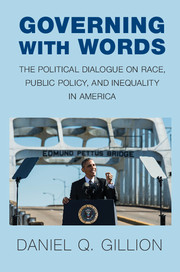Book contents
- Frontmatter
- Contents
- List of Figures
- List of Tables
- Acknowledgments
- Introduction
- 1 Discursive Governance: Toward a Holistic Approach to Understanding a Dialogue on Race in Government
- 2 Measuring the Political Dialogue on Race
- PART I Societal Reception to a Dialogue on Race
- PART II Political Institutions and a Dialogue on Race
- Conclusion: A Place for a Racial Dialogue in an Aspiring Post-Racial Society
- Appendix A Defining and Measuring Race-Related Statements
- Appendix B Study Description and Coding across Chapters
- Appendix C Wharton Behavioral Lab Experiments and the National Experiment
- Appendix D Method for Assessing the Overlap of Presidential Discussion and Minority Magazine Articles: Text Reuse (Plagiarism Analysis)
- References
- Index
Introduction
Published online by Cambridge University Press: 05 April 2016
- Frontmatter
- Contents
- List of Figures
- List of Tables
- Acknowledgments
- Introduction
- 1 Discursive Governance: Toward a Holistic Approach to Understanding a Dialogue on Race in Government
- 2 Measuring the Political Dialogue on Race
- PART I Societal Reception to a Dialogue on Race
- PART II Political Institutions and a Dialogue on Race
- Conclusion: A Place for a Racial Dialogue in an Aspiring Post-Racial Society
- Appendix A Defining and Measuring Race-Related Statements
- Appendix B Study Description and Coding across Chapters
- Appendix C Wharton Behavioral Lab Experiments and the National Experiment
- Appendix D Method for Assessing the Overlap of Presidential Discussion and Minority Magazine Articles: Text Reuse (Plagiarism Analysis)
- References
- Index
Summary
Words are important, words matter, and the implication that they don't, I think, diminishes how important it is to speak to the American people directly about making America as good as its promise.
–Barack ObamaOn June 14, 1997, a balmy spring day in La Jolla, California, President William Clinton rose from his chair to offer a motivational commencement address to the graduating class of the University of California, San Diego. The class looked like a mosaic of America's races and ethnicities, and the setting provided the perfect backdrop for Clinton to introduce his new race initiative. In the comforting and informal rhetoric that only Clinton could espouse, he laid out his vision:
I want to lead the American people in a great and unprecedented conversation about race. In community efforts from Lima, Ohio, to Billings, Montana, in remarkable experiments in cross-racial communications like the uniquely named ERACISM, I have seen what Americans can do if they let down their guards and reach out their hands.… Honest dialogue will not be easy at first. We'll all have to get past defensiveness and fear and political correctness and other barriers to honesty. Emotions may be rubbed raw, but we must begin. (Clinton 1997, 881)
And with these words, Clinton started a new discourse that he called “One America in the 21st Century: The President's Initiative on Race.” The Civil Rights Monitor, a quarterly publication that reports on civil rights issues, lauded the initiative as an opportunity for the president to articulate his vision of a unified America, educate the nation about the facts surrounding race, encourage political leaders to bridge the racial divide, and develop solutions to address racial disparities across multiple issue areas. But the most important thing Clinton proposed, the initiative's overarching goal, said the Monitor, was the call for a constructive dialogue. Unlike any president before him, Clinton recognized that solutions to inequities in education, health, and economic well-being would have to include difficult conversations about race – not just at a policy level but in communities as well. As a major component of the initiative, Clinton established an advisory committee consisting of prominent educators, lawyers, politicians, and business executives. The seven-member advisory board was designed to counsel the president in his efforts to “promote a national dialogue on controversial issues surrounding race.”
- Type
- Chapter
- Information
- Governing with WordsThe Political Dialogue on Race, Public Policy, and Inequality in America, pp. 1 - 14Publisher: Cambridge University PressPrint publication year: 2016



